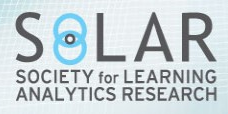February 9, 2014 | 12:00pm – 1:30pm
Speaker: Ryan Baker
Abstract:
Towards Long-Term and Actionable Prediction of Student Outcomes using Automated Detectors of Engagement and Affect
In recent years, researchers have been able to model an increasing range of aspects of student interaction with online learning environments, including affect, meta-cognition, robust learning, and engagement.
In this talk, I discuss how automated detectors of engagement and learning can be used in prediction of long-term student outcomes, illustrating this with examples of how affect, engagement, and learning during middle school use of educational software can support prediction of student long-term success, including end-of-year learning, decisions about whether to attend college, and even what major a student chooses. These predictive models can in turn support inference about what factors make a specific student at-risk for poorer learning or lower long-term engagement in learning.
Speaker Bio:
 Ryan Baker is Associate Professor of Cognitive Studies at Teachers College, Columbia University. He earned his Ph.D. in Human-Computer Interaction from Carnegie Mellon University. Dr. Baker was previously Assistant Professor of Psychology and the Learning Sciences at Worcester Polytechnic Institute, and served as the first technical director of the Pittsburgh Science of Learning Center DataShop, the largest public repository for data on the interaction between learners and educational software. He is currently serving as the founding president of the International Educational Data Mining Society, and as associate editor of the Journal of Educational Data Mining. His research combines educational data mining and quantitative field observation methods to better understand how students respond to educational software, and how these responses impact their learning. He studies these issues within intelligent tutors, simulations, multi-user virtual environments, and educational games.
Ryan Baker is Associate Professor of Cognitive Studies at Teachers College, Columbia University. He earned his Ph.D. in Human-Computer Interaction from Carnegie Mellon University. Dr. Baker was previously Assistant Professor of Psychology and the Learning Sciences at Worcester Polytechnic Institute, and served as the first technical director of the Pittsburgh Science of Learning Center DataShop, the largest public repository for data on the interaction between learners and educational software. He is currently serving as the founding president of the International Educational Data Mining Society, and as associate editor of the Journal of Educational Data Mining. His research combines educational data mining and quantitative field observation methods to better understand how students respond to educational software, and how these responses impact their learning. He studies these issues within intelligent tutors, simulations, multi-user virtual environments, and educational games.


